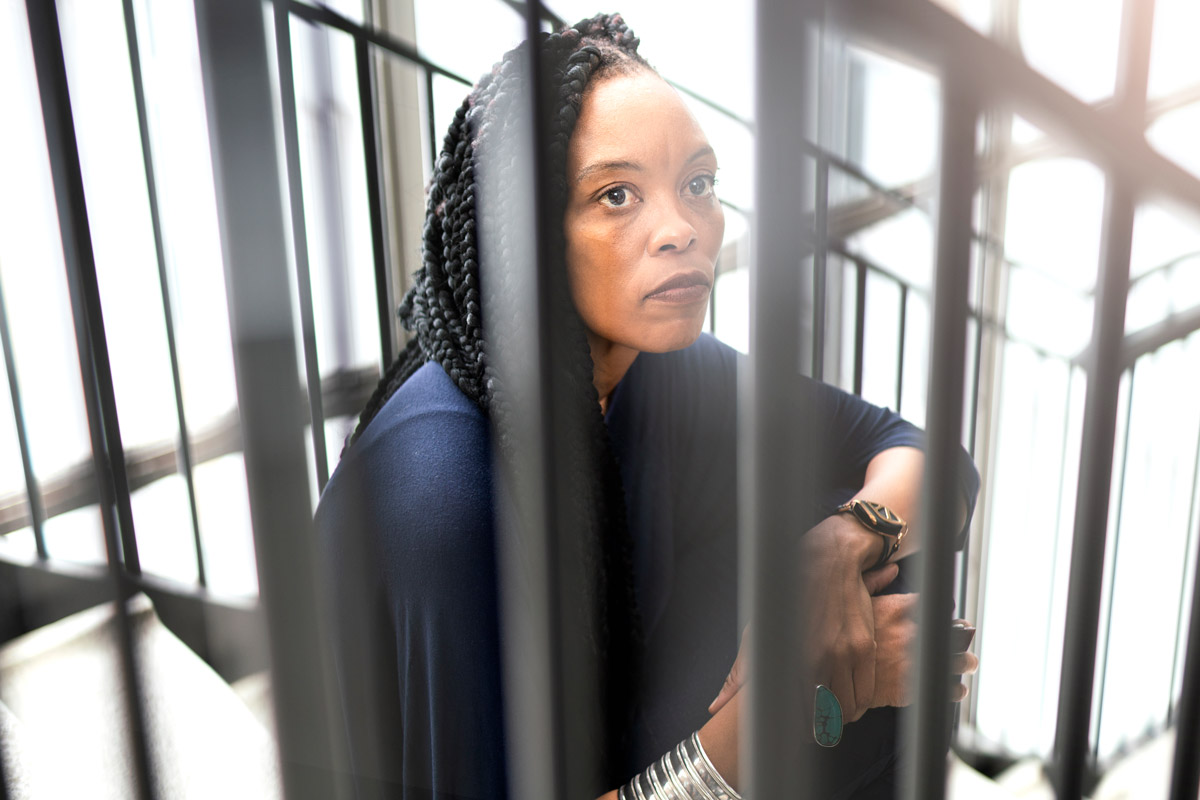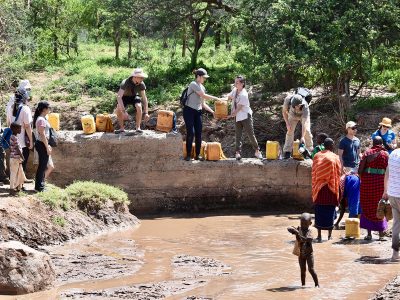By Dan Rubinstein
Photos by Chris Roussakis
Positive reviews can be very important to writers. When you work in a void, critical praise in the press validates all those hours of isolation and creative angst.
But for Kagiso Lesego Molope, a Film Studies graduate student at Carleton, having a pair of novels named to national best books lists last year was particularly meaningful.
“It makes me feel like I have a place in Canadian literature,” says Molope, who moved to Montreal from South Africa in 1997 and initially thought that her writing would only resonate in her homeland.
“As an immigrant, I feel embraced,” she continues. “You feel more at home if you can bring your work to readers in your chosen country. Maybe I had thought that my stories weren’t universal enough. Now I feel encouraged to keep going.”
Such a Lonely, Lovely Road, about a gay black medical student coming out in AIDS-ravaged Cape Town in the 1980s, was on the CBC’s list of best Canadian fiction in 2018, while This Book Betrays My Brother — a young adult novel narrated by a teenaged girl who witnesses her beloved brother commit a violent crime — was selected as one of the Globe and Mail’s 100 best books last year.
Published by Toronto-based Mawenzi House, dedicated to fresh writing reflecting the diversity of Canada, both novels are rooted in South Africa — and both are inextricably linked to the reasons Molope feels compelled to write.
“I have always had the ‘burden of the survivor,’” she says. “I lost so many of my friends to apartheid violence and then, in my late teens, to gender-based violence and AIDS. I am one of very few surviving women from my neighbourhood. Lots of homes are empty. I don’t have these people to grow into adulthood with, so I’m trying to find a way to honour their memories.”

Canada a Natural Choice
Molope was born and raised in Mabopane, a township north of Pretoria, and was a teenager in the dying days of apartheid.
In 1994, the year Nelson Mandela was sworn in as president, she started to study English literature at the University of Cape Town, a historically white school.
Classes were integrated. Dormitories were not. And all of the professors were white.
“It was a big year,” says Molope. “There were a lot of rallies and protests. The air was charged with the idea of change. Change was coming. But the university was far from change.”
She emigrated to Canada because South Africa remained a dangerous and exhausting place to live despite all the shifts taking place.
“I never felt safe,” says Molope. “I had to look over my shoulder all the time. It was hard. So many of my friends were dying. I needed to get away from all that death.”
For somebody who was young, educated and English-speaking, Canada was a natural choice. At the time, lots of black South Africans were returning home from exile — for Molope, Canada was her “chosen exile,” a place it felt easier to be than anywhere else.

Kagiso Lesego Molope Discovers Her Form of Expression
After three years in Montreal, which she found to be surprisingly segregated, without much social mixing across colour lines, Molope moved to Hamilton and started working at an immigrant and refuge welcome centre in Toronto.
She had always wanted to write, but didn’t know what form her expression would take. One morning in 2001, commuting by train to Toronto, reading a book called The Farming of Bones, a story about violence, love and survival by Haitian-American writer Edwidge Danticat, Molope saw clearly that she would become a novelist.
That summer, she wrote seven pages of what would become her first novel, Dancing in the Dust, and “cheekily” sent it to three publishers on a Friday. On Monday, the company that evolved into Mawenzi House said it wanted to see the rest of the book.
Molope replied that she just needed to “put some finishing touches” on the book, then spent two weeks frantically finishing the manuscript. After two more weeks of editing and polishing with friends, she submitted the text, and it was accepted.
Published in 2002, Dancing in the Dust, a family saga set in a township outside Pretoria during the turbulent 1980s, was selected to the honour list of the International Board on Books for Young People. Her next novel, 2005’s The Mending Season, about a black teenaged girl attending a “mixed” school, was selected for school curricula in South Africa — a monumental change after decades of such books being banned under apartheid.
“Once I get down to it, writing flows quite naturally,” says Molope. “For me, it’s one of the easiest things to do. It simplifies my life. Because you carry stories inside for so long, it’s very important to get them out. It’s a big release — writing to share the stories of so many people.
“A lot of characters come to me with their lives already there, already full. You have to give them a place in the world.”
Similarities Between Northern Indigenous Communities and People in South Africa
Molope moved to Ottawa in 2005 for a job with the United Nations Association in Canada, travelling around the country to teach young people about the Charter of Rights of Freedoms and learning about their concerns.
She got to see almost all of Canada and was struck by similarities between people in northern Indigenous communities and people in South Africa, such as the lack of access to resources and employment opportunities and high rates of depression.
She continued to write fiction and then, last year, because film and scriptwriting were something she had always considered and because she felt isolated as a writer, she began a master’s program in Film Studies and African Studies at Carleton.
“I wanted to be part of an exchange of ideas,” says Molope, whose thesis will explore the role of activist audio-visual media — such as using cellphone videos to document history — in the Black Lives Matter movement. (“I’ve got to narrow that down a little,” she concedes.)
In late January, Carleton’s Institute of African Studies (IAS) hosted a launch event for Such a Lonely, Lovely Road featuring an onstage conversation between Molope and professors Nduka Otiono (IAS) and Susanne Klausen (History and IAS).
“I first discovered Kagiso Molope when I was conducting research for my book on abortion in South Africa during the apartheid era, a time when it was all but impossible to get a safe, legal abortion — especially for black women,” says Klausen. “I was looking for stories by and about black women and adolescents who had been forced to have clandestine abortions, and that’s how I came across her wonderful novel, Dancing in the Dust.
“The novel gives a very powerful, poignant glimpse into the lives of teenage black girls exploring their sexuality in a culture that was very puritanical and sexist. Knowing that the novel was based on lived experience, I quoted passages in my study on abortion as a way to allow black girls to speak for themselves about the injustice they faced.”
Broadening the Conversation About What Africa Is
Ultimately, by studying film through the lens of diversity, and by joining a community of African scholars, as well as through her writing, Molope wants to help broaden the conversation about what Africa is.
“Africa is often thought of as a village, as one country with one language, but it’s an enormous continent with a history that needs to be rewritten in many ways by many people,” she says. “As an African intellectual living the West, that’s exciting to me.”
In addition to studying full time at Carleton and doing book talks, tours and workshops, Molope has three novels on the go at the moment.
One is about a South African woman who becomes friends with an Indigenous woman. They discover similarities, including childhood experiences and memories of people they’ve lost. “Canadians are increasingly curious about stories about recent immigrants,” she says, “and you can go anywhere in a story.”
But South Africa is still very much front of mind for Molope.
“I’ve left but I haven’t left,” she says. “We’ve been through so much trauma. As part of the surviving generation who helped take the country to freedom, I want to write about apartheid. There are so many stories that still need to be told.”
Monday, March 4, 2019 in Faculty of Arts and Social Sciences, Film
Share: Twitter, Facebook



